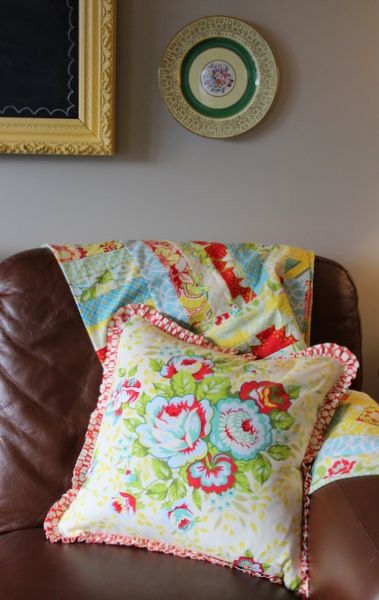
I used some Pop Garden and Nicey Jane fabrics by Heather Bailey and added Amy Butler's Full Moon Dot in Cherry for the ruffle (I may use the dot for the back of my quilt). My main inspiration was of course the quilt but also {this pillow} which I still plan to make one very similar too. And this {little grouping} too.
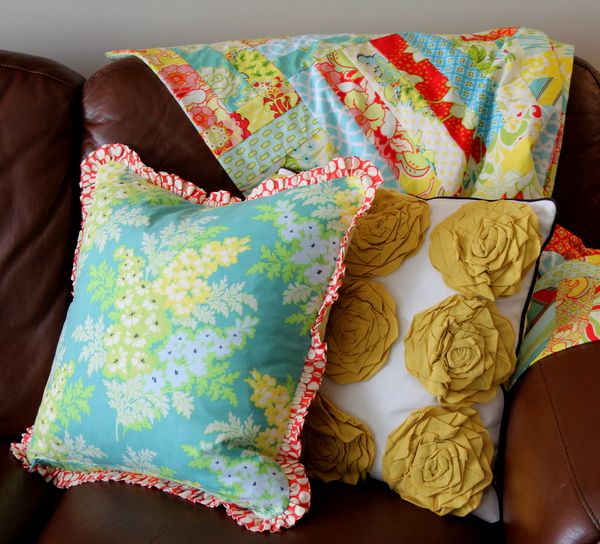
Now it's your turn. Pick your fabrics, grab your supplies and make yourself a reversible, ruffles, zippered pillow!
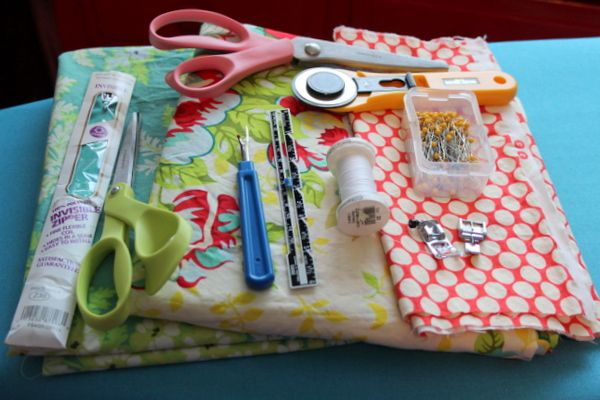
I bought pillow inserts from Ikea. They aren't actually down (the tag says "water fowl feathers"). But they sit like down on the sofa, and were uber cheap. Since we have leather, I knew I needed something with a "plop" to it so it wouldn't slide right off. Since they are feathers, the sharp ends do poke out of the covering. By the way did you know that's why they make ticking? It's a more densely woven fabric, meant to keep feather inside. Anywho...so far, having the extra layer of my pillow cover makes that less noticeable. But I still wouldn't want to sleep with my face on these. Which is fine because they are meant for decoration.
My pillow form said it was 20"x20", but when I measured it, it was more like 19"x19". Since the feathers will squish up and I wanted them to feel more full, so I made my covers 17"x17" finished. If you have a denser poly filled pillow form, it might be harder to squeeze it into a too-small pillow cover. Just an fyi for ya.
You'll need to purchase an invisible zipper that coordinates with your fabric. Matching or contrasting, it's up to you. Everything I read said to buy a zipper that's 2" shorter than the width of your pillow, but my store didn't have an appropriate size in the color I wanted. Thankfully, you can shorten a longer zipper (non-metal that is) to any length you need. I'll show you how in a little bit. So I bought 20" zippers.
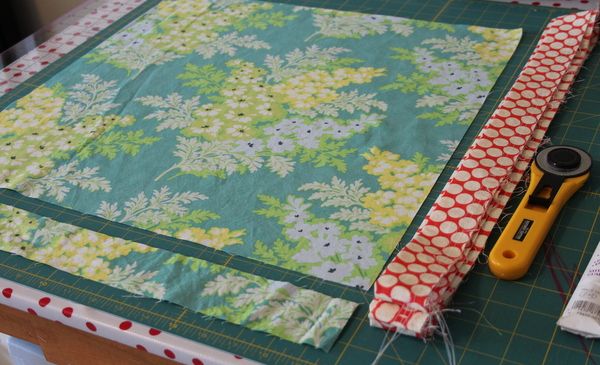
First, you'll need to cut your fabric. For the front (cream floral not shown), I cut an 18" square. For the back (blue floral), I cut the upper portion at 18" wide by 17" tall. Then I cut a 2" x 18" strip for below the zipper. I'll be using a 1/2" seam allowance for this whole project so that means that the zipper will sit 1" up from the ruffle. And with the plop factor of my feather inserts, it won't be very noticeable.
Here is where the learning curve came in for me. I originally read{these instructions} for installing a zipper on a pillow cover, but since I had a ruffle I couldn't put it in the same place. Let's just say, I tried it and it was a disaster so I had to start over with my back piece. The upside is that now you get to do it the easy way. I don't think you even know how lucky you are. ;) I was ready to scrap the whole thing since the 2 hour window I gave myself, before our dinner guests arrived, was already up.
For now we are just going to work with these back pieces and get that zipper installed. After that it will be smooth sailing. I promise.
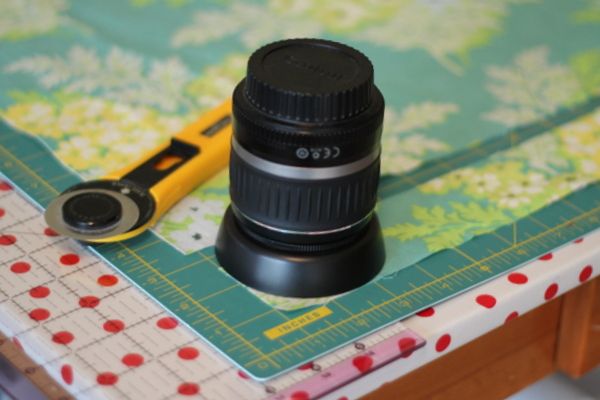
For all four outside corners you'll want to round them a bit. I just rotary cut around my camera lens since it's what was close at the time and the shape was good. You could use a small plate or a cup instead. Do NOT round the bottom of the larger piece. You need that side to stay straight since it will be along one side of the zipper. Yep, I made that mistake too. *lowers head in shame*
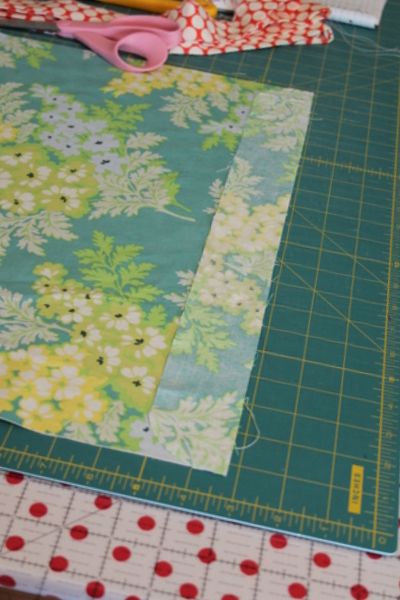
Now, lay your 2" strip with right sides together along the bottom of the top piece. You can barely see it in this photo, but the corners on the 2" strip (that will eventually be the bottom of the pillow) are rounded.
Here is my way too long zipper. Let's fix that.
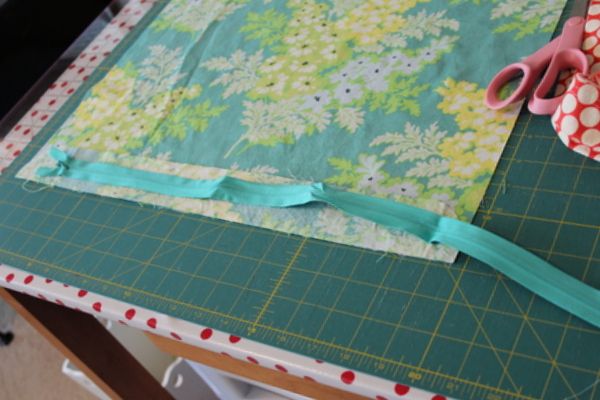
Just take your pinking shears (the scissors with the zig zag edge) and lop off a few inches. You could also use regular shears, but the zig zag keeps the cut edge from fraying when washed. Anywho...either before or after you cut (I did it after this time, but I've done both ways) bring the cut end of the zipper over to your machine and just sew back and forth across the zipper, about 1/2" from the cut, making yourself a new stop. That's it!
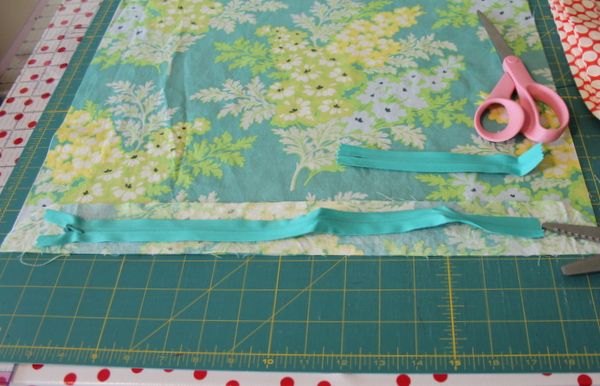
Now iron the zipper and center it along the edge.
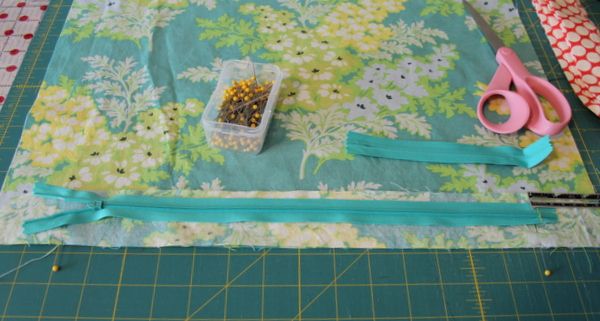
I ended up with 2.5" left on either side. But 1.5" would have been better since I had to really squish the pillow to get it through the zipper. Just sayin. Measure from the edge of the fabric to just inside the zipper stop on both ends. Place pins at those points. Below, you can see where I stitched the new stop for the end of the zipper.
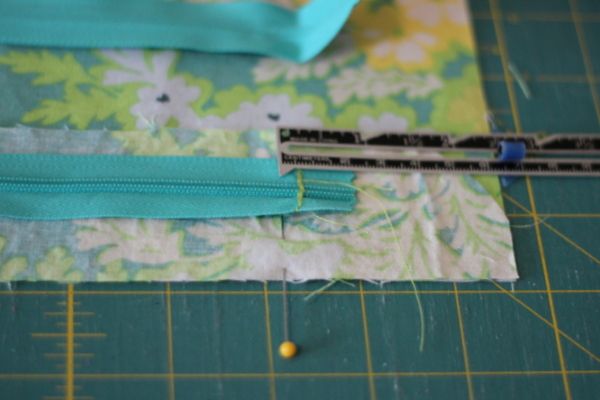
I have no photos of this part, but place a few extra pins between those two pins that mark the length of the zipper, and take it over to your machine. Start sewing at one end with a 1/2" seam allowance using a regular stitch length. Back-stitch to reinforce as you are starting out. STOP when you get to that first pin. Back stitch again (only above the pin) and then change your stitch-length to the largest you have for a basting stitch. You are now going to baste stitch the length of where the zipper will be. This is so you can keep the seam closed when sewing on the zipper, then easily remove that seam after it's attached. When you get to the last pin, cross over it and change your stitch-length back to normal. Back-stitch again to reinforce (but not between the pins) and finish the seam. Back-stitch at the very end too.
Next, I trimmed the selvedge of that seam with my pinking shears so it won't fray in the wash. I could have serged both sides of the fabric before sewing the seam, but I forgot.
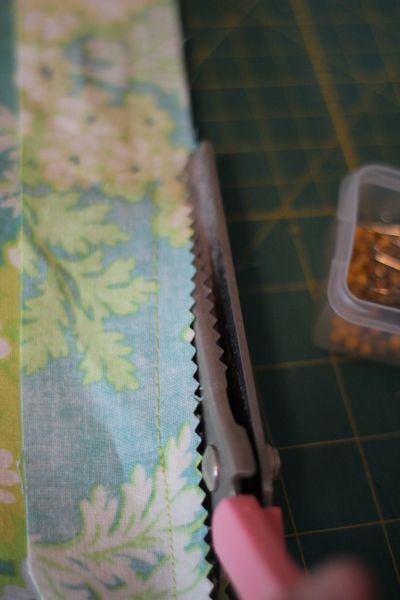
Now press your seam open.
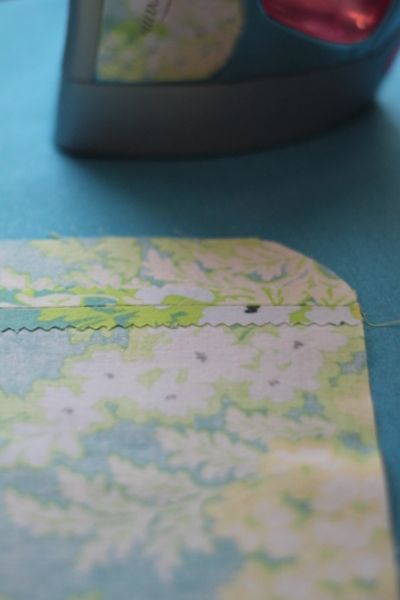
And starting at that first pin (if you removed it, just think back to how far it was from the edge, mine was 2.5"), lay your zipper down with the stop just outside that pin. Then use the seam to guide you and place the zipper (rightside up) along that seam.
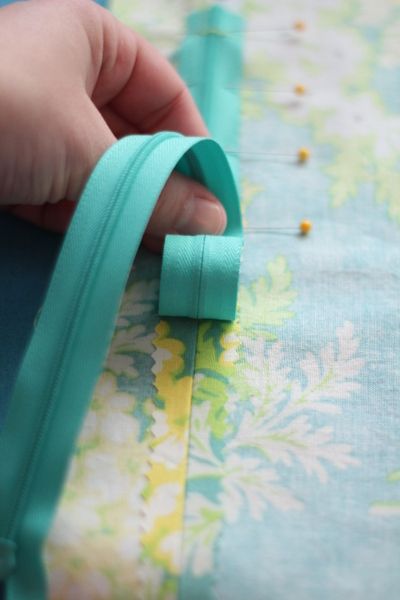
Ending at the other pin that was 2.5" from the edge (or whatever your measurement was). I removed the pin since the zipper pull was right there.
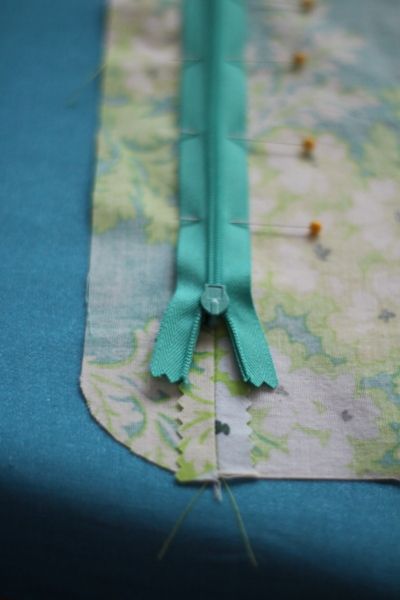
Now put your zipper foot on your machine and start sewing above the stop you made earlier, but on the long side of it. Go back and worth a few times to anchor it and then start sewing down the right side of the zipper.
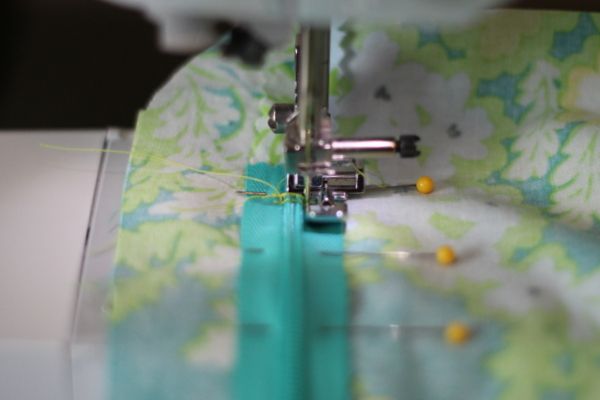
Keep going until you get to the zipper pull.
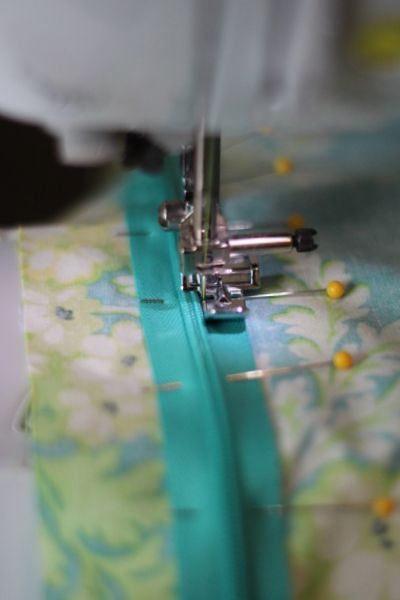
This is the tricky part and I have yet to master it. I can only assume that it will get easier the more I do. And believe me, there will be more. I'm hooked and have about five more pillow covers to make. And that's just for spring and summer. ;)
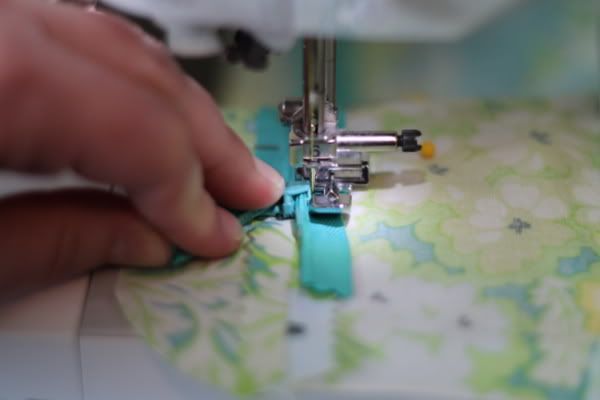
Lift the presser foot and gently push the zipper pull back behind the foot.
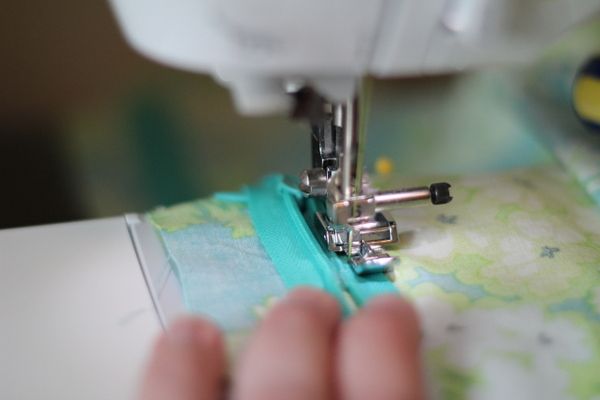
You can add some pins back in, but I just held it with my fingers. Hold both sides of the zipper stop together and sew across it back and forth several times to anchor it.
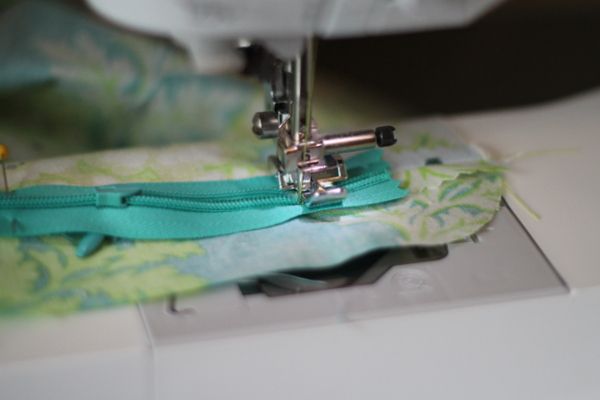
rotate your fabric and start sewing down the opposite side you sewed before, until you get to that pesky zipper pull again.
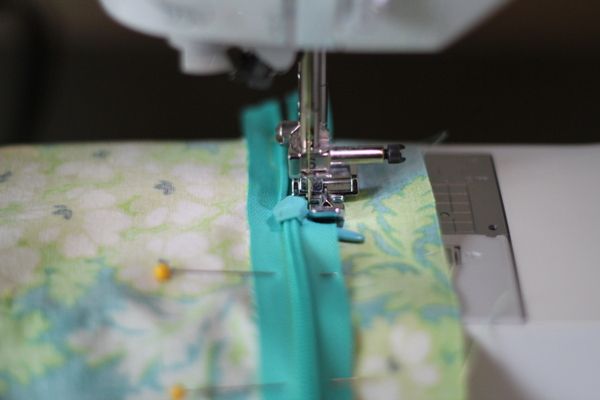
Lift your presser foot again and slide (no, that makes it sound too easy and it's not) with a screwdriver (there, that's better) until it gets behind your presser foot.
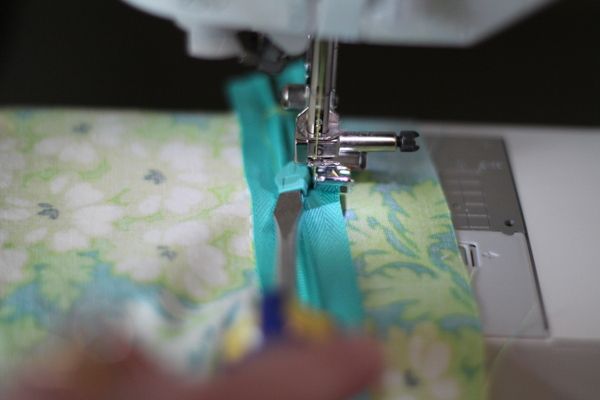
Zipper pull, get thee behind me!
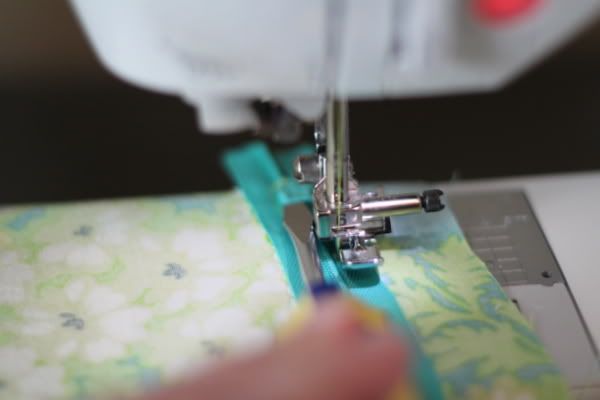
Now it's a breeze. Whew! Just continue sewing down this side.
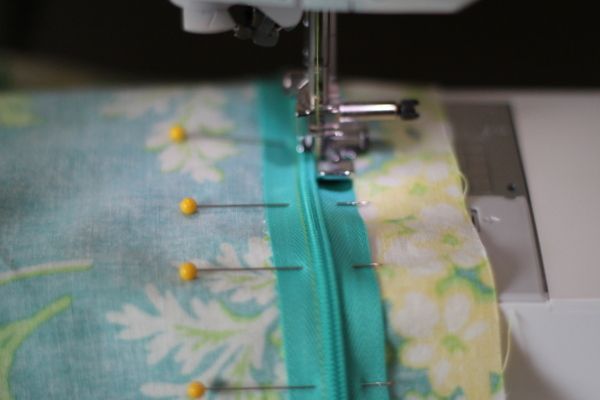
And reinforce the end you started at, one more time.
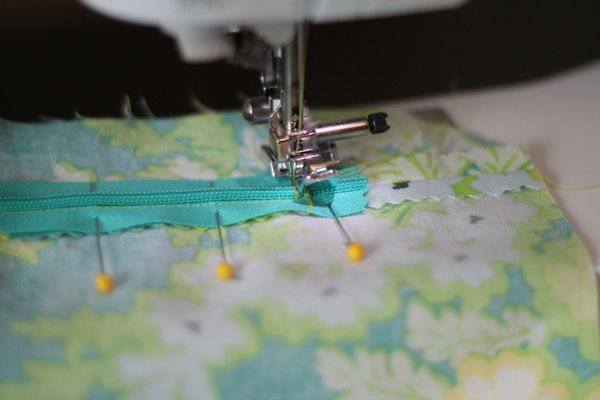
Remove those pins and flip it over. See how that rounded corner is in the correct place now? I love it when things come together like I envisioned.
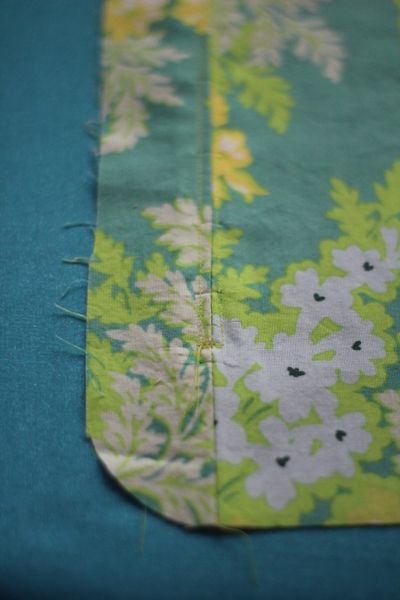
Carefully remove the basting stitch that's on top of the zipper.
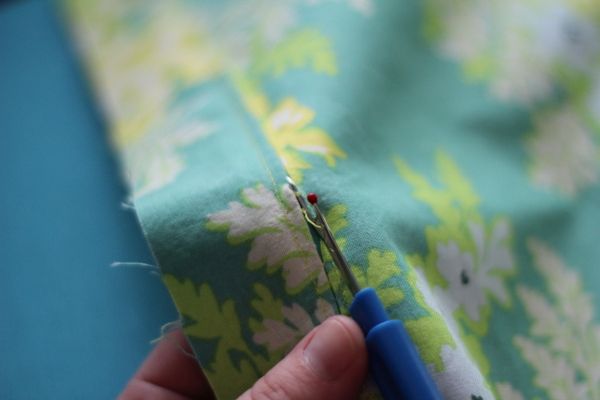
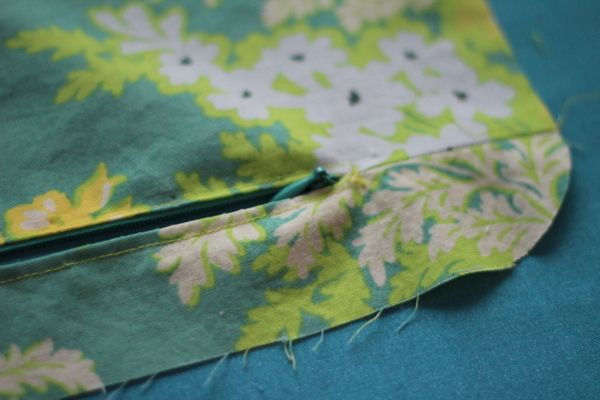
Set the back aside and go ahead and round the corners on your top piece.
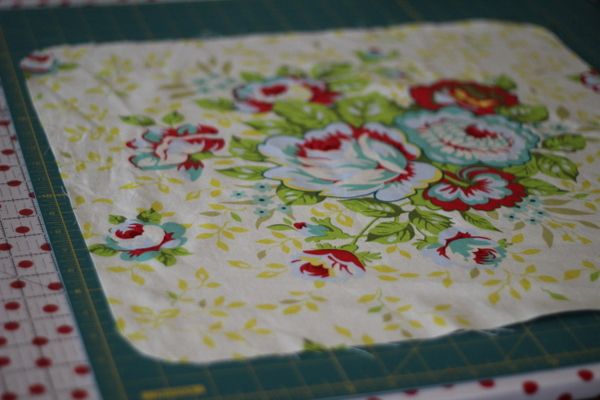
Now I have to apologize that I have no photos of how to make the ruffle itself. I cut out all the pieces several days before I thought of making this a tutorial.
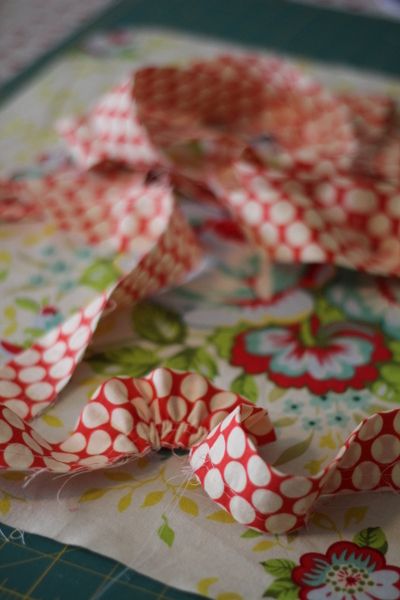
What you see there ^ is fours strips of fabric that were each double the width of one side of the pillow (18" x 2 = 36") by 3" wide. I sewed all the ends together so it would be in the round and then ironed the seams open and the whole strip in half. The strip now measures 1.5" wide so it will be a 1" ruffle around the pillow. There are 4 sections so that one section will line up on each of the 4 sides of the pillow.
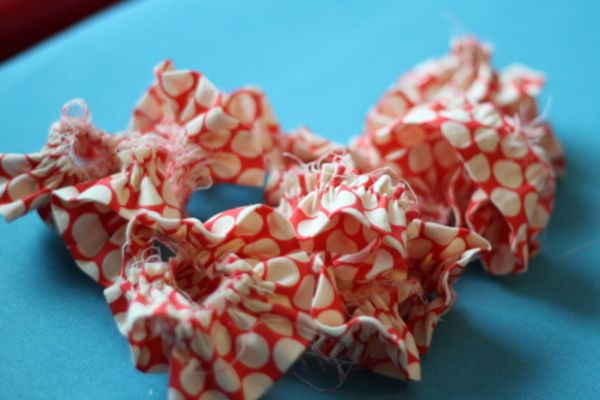
I then sewed 2 basting stitches all the way around the open edge and pulled on the tails until it looked small enough to fit around the pillow. Don't skimp and use just one basting stitch. I broke one row on each side when pulling on the tails to ruffle the fabric. That's a ton of fabric you are pulling along. You can find out more about ruffling this easy way in my {tutorial here}. I didn't pin all of the in between points for this like I do in my gathering tutorial. Instead I just lined up the 4 seams with the middle of each of the 4 corners and then pinned the ruffle evenly along each side.
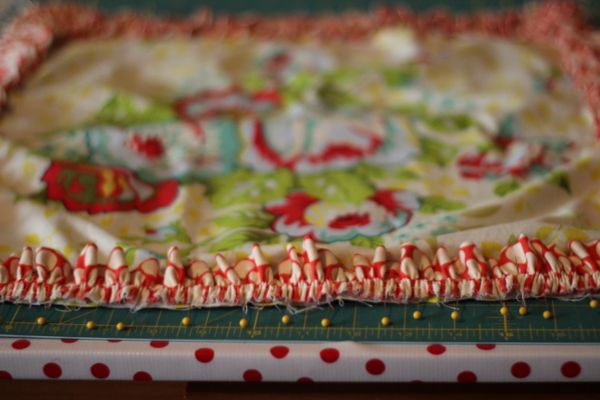
Next sew the ruffle on to the right-side of your front fabric, making sure you are stitching inside of a 1/2" seam allowance. You don't want these stitches to show on the final product. I also ironed the ruffle down flat so it wouldn't get bunched up in the final assembly. I also just prefer flat ruffles.
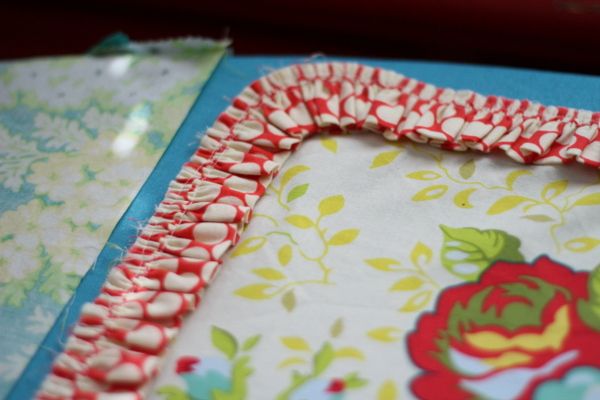
Next lay your pillow top on your pillow bottom with right-sides together. Pay attention to the top and bottom if yours is directional (the zipper belongs at the bottom). I made my pillows identical, so I made sure my floral bouquet was facing the same direction on both pillows. The piece with the ruffle attached is on top for a reason. And I'm at a loss for how to explain that for now. Just trust me on it. ;)
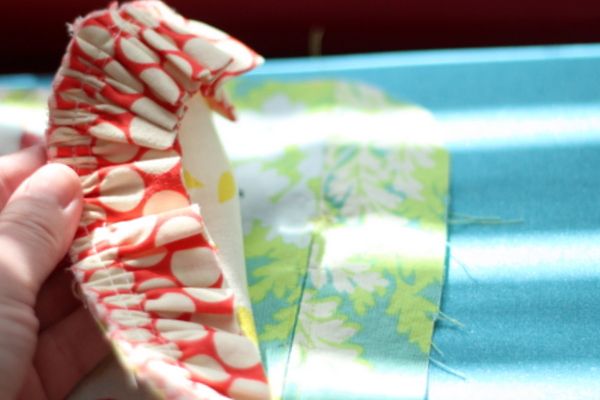
Now you are going to sew around all of the edges of the pillow case. Leave the zipper open a little so it's easy to open when the 4 sides are shown shut. You do not need to leave an opening in your seam since you will turn it right-side out through the zipper hole. Next, turn it right-side out and see how everything looks.
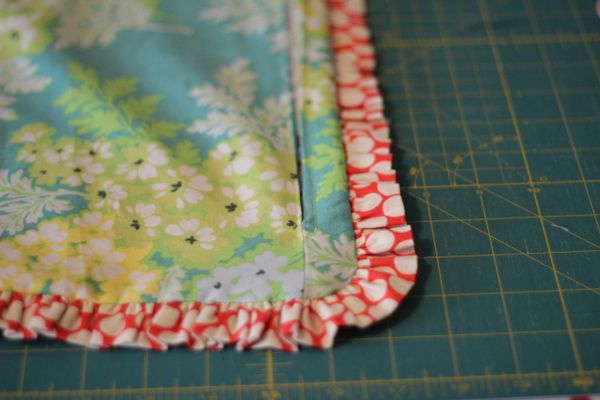
I could have gone back and fixed this corner, but I just wanted to be done. The ruffle looks flat here.
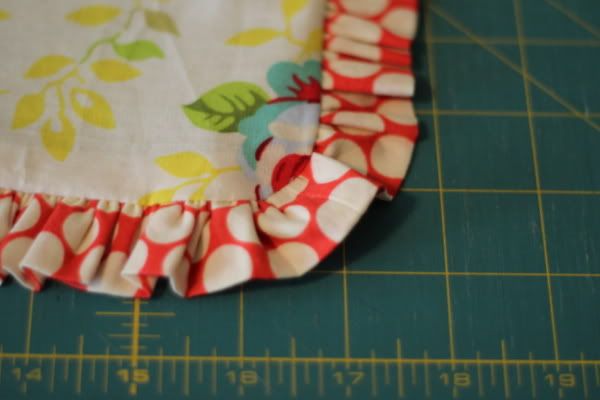
All corners should look more like this one.
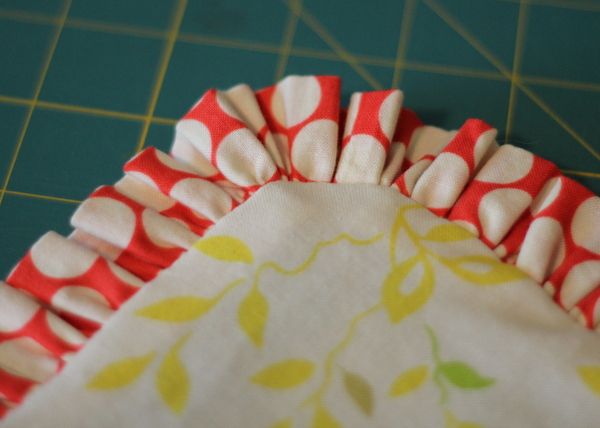
Turn it inside out again and go back and serge that seam. If you don't have a serger, you can use a zig zag stitch and let it fall off the edge. Having kids that will no doubt be drooling on these pillows, I know mine will get washed plenty. I'd rather have a finished edge on the inside and not have to deal with all the tangled threads everytime it's washed.
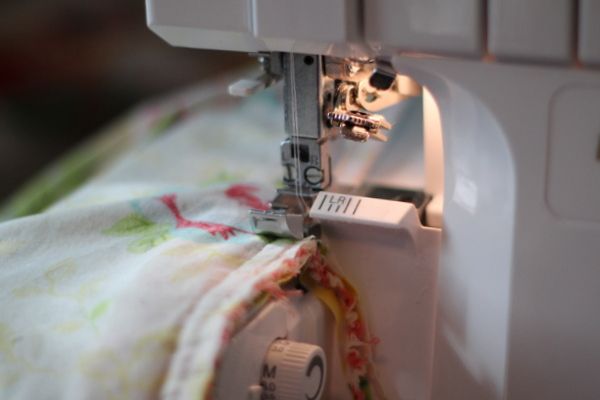
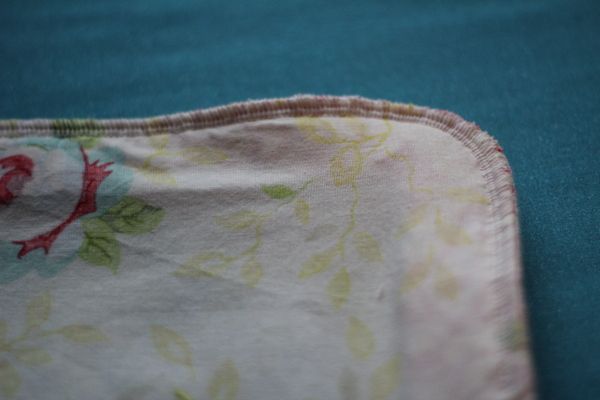
Turn it back again and. you. are. done! Give yourself a big pat on the back and snuggle up with your new pillow.
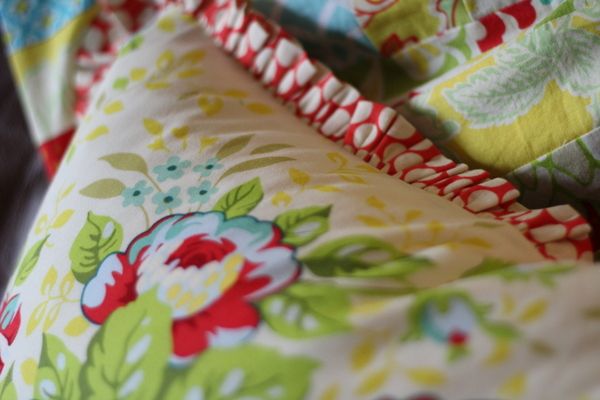
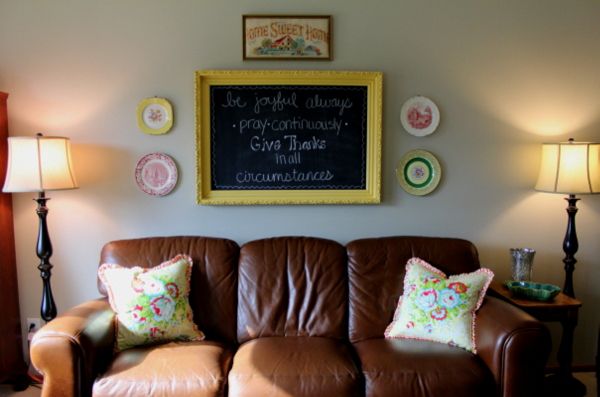
I just love that these are reversible. I could have made them with an envelope style back, but I don't think that's as pretty if you plan to use the backside. And I do! I think I actually prefer the backside (the blue).
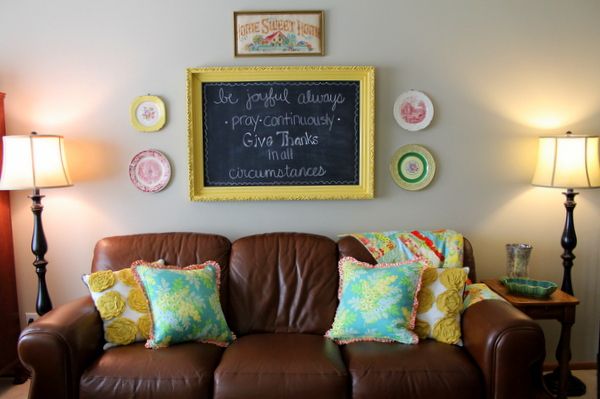
I'd love to know if you try this. And as always, leave questions in the comments. I'm more than happy to help.
If you need some pillow inspiration (I've been gathering for a while), here's my board on {Pinterest}. Now to decide which one to make next. I can't wait to get my hands on some Riley Blake gray or aqua chevron. Yummy!

What a great tutorial!! I've been wanting to make a zippered pillow. Thanks for sharing.
ReplyDeleteOh I just love the fabric your used! They look wonderful in your family room.
ReplyDeleteLove them!! The Nicey Jane side is my favorite! And...paint, paint, paint the antique sewing table!! It will make the black machine pOP!
ReplyDelete